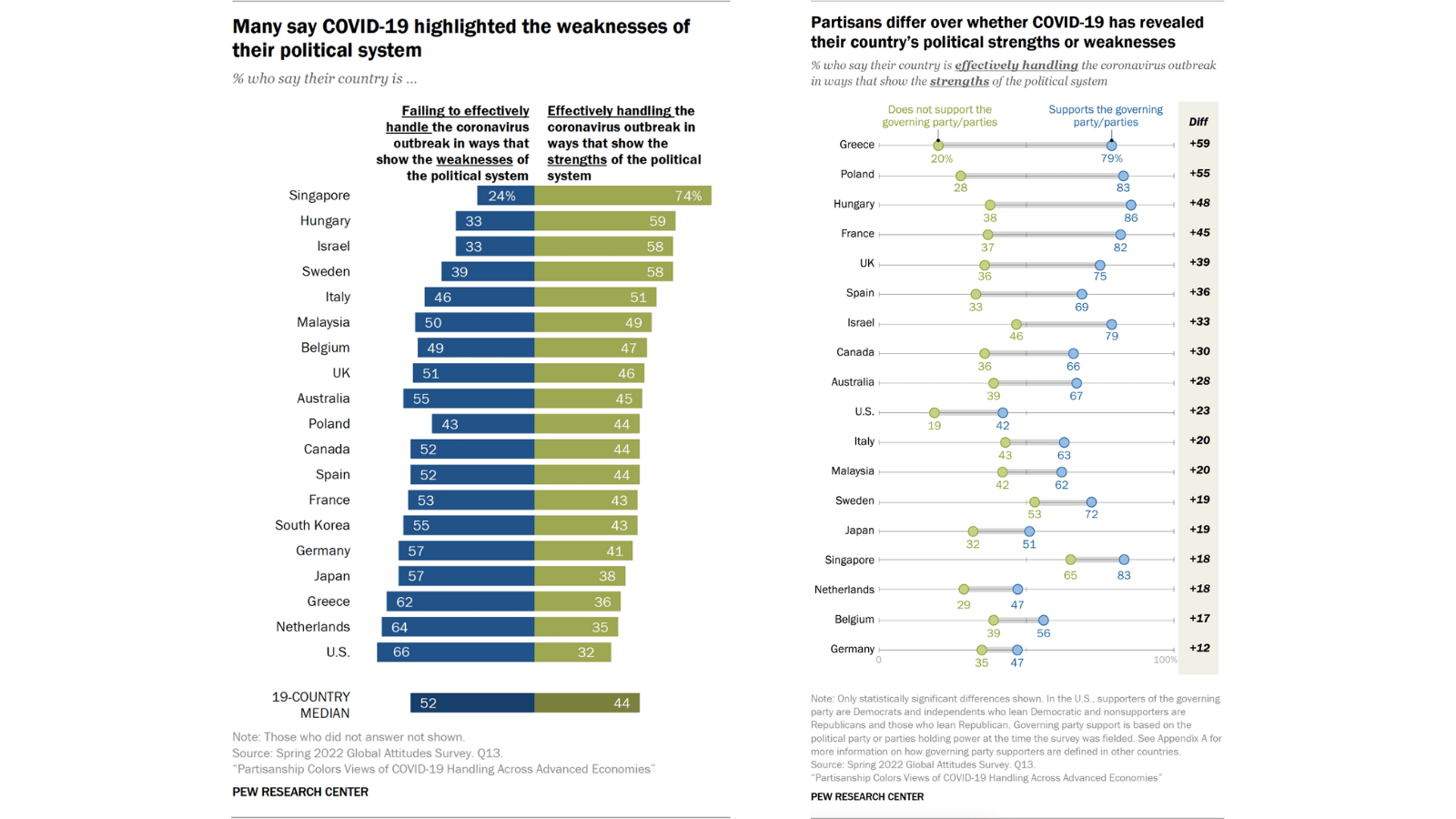KUALA LUMPUR, August 18 – Fifty per cent of Malaysians polled in a Pew Research Center survey say Malaysia is failing to effectively handle the Covid-19 pandemic in ways that show the weaknesses of its political system.
This slightly exceeded the 49 per cent of Malaysian respondents in the international Spring 2022 Global Attitudes Survey by the American non-partisan think tank who believe that Malaysia is effectively handling the coronavirus outbreak in ways that show the strengths of its political system.
Pew Research Center’s recent survey, published last August 11, was conducted in 19 advanced economies. Its poll in Malaysia was conducted via phone interviews among 1,003 respondents aged 18 and older between March 7 and April 24 this year.
Malaysians who support the governing party or coalition – defined in the Pew survey as Umno and Barisan Nasional (BN) – were more likely to say that Malaysia is effectively handling the Covid-19 pandemic in ways that show the strengths of the political system at 62 per cent.
However, only a minority (42 per cent) of Malaysian respondents who do not support Umno-BN share that view, translating to a difference between partisans of 20 percentage points.
Malaysia’s 50 per cent rate of those who say that their country is failing to handle the Covid-19 outbreak in ways that show the weaknesses of their political system is close to the 52 per cent median across 19 countries surveyed by Pew Research Center.
In Singapore, just 24 per cent of respondents feel this way, as most say that the way their country has handled the coronavirus pandemic highlights their country’s political strengths, a sentiment shared by the majority in just a handful of other countries – Hungary, Israel, and Sweden. This opinion is highest in Singapore at 74 per cent.
While Pew Research Center defined Malaysia’s governing party or coalition as Umno-BN, the current administration led by Prime Minister Ismail Sabri Yaakob, who is from Umno, comprises BN, as well as Bersatu and PAS from Perikatan Nasional, along with ruling state parties in Sabah and Sarawak.
For most of the Covid-19 pandemic until Ismail Sabri was appointed prime minister in August 21, 2021, around the same time when Malaysia’s outbreak began subsiding, the government was led by Prime Minister Muhyiddin Yassin from Bersatu.
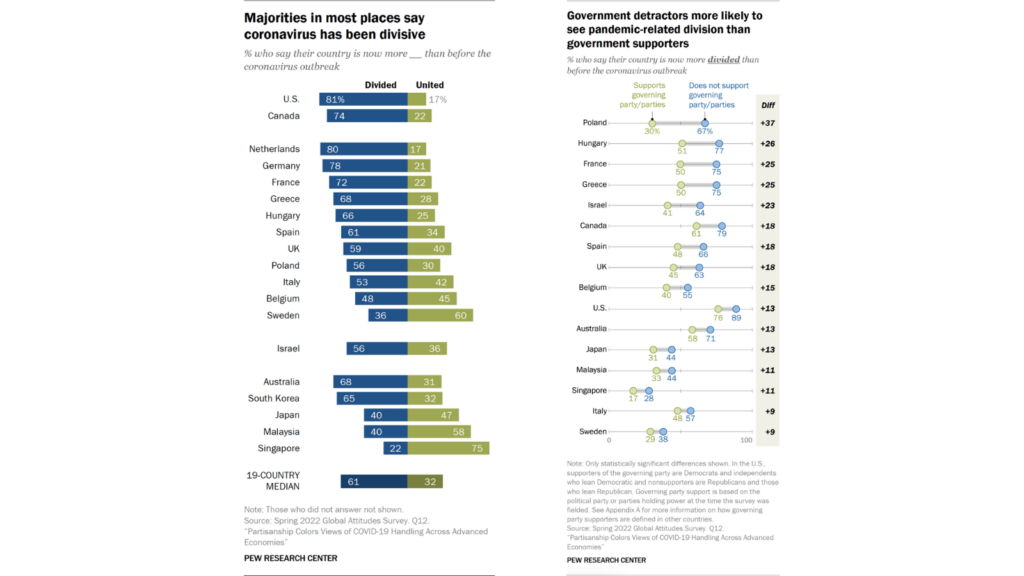
Malaysia, Singapore, and Sweden bucked the trend on sentiments about the divisiveness of the Covid-19 pandemic in their countries, with the majority in these countries saying that their country is now more united than before the pandemic.
Three-quarters (75 per cent) of Singaporeans say their country is now more united than before the coronavirus outbreak, the highest in the survey and exceeding the majority who hold this view in Sweden (60 per cent) and Malaysia (58 per cent).
Across the 19 countries surveyed, people largely feel their society is more divided now than before the pandemic, with a median of 61 per cent who feel that Covid-19 has divided their country, compared to just 32 per cent who think that the pandemic increased national unity.
Partisanship was also reflected in sentiments on whether the pandemic increased societal divisiveness or unity, as government detractors were more likely to see pandemic-related division than government supporters across the survey.
In Malaysia, 44 per cent of respondents who do not support the governing party or coalition (Umno-BN) say their country is now more divided than before the Covid-19 pandemic, 11 percentage points higher than Umno-BN supporters at 33 per cent.
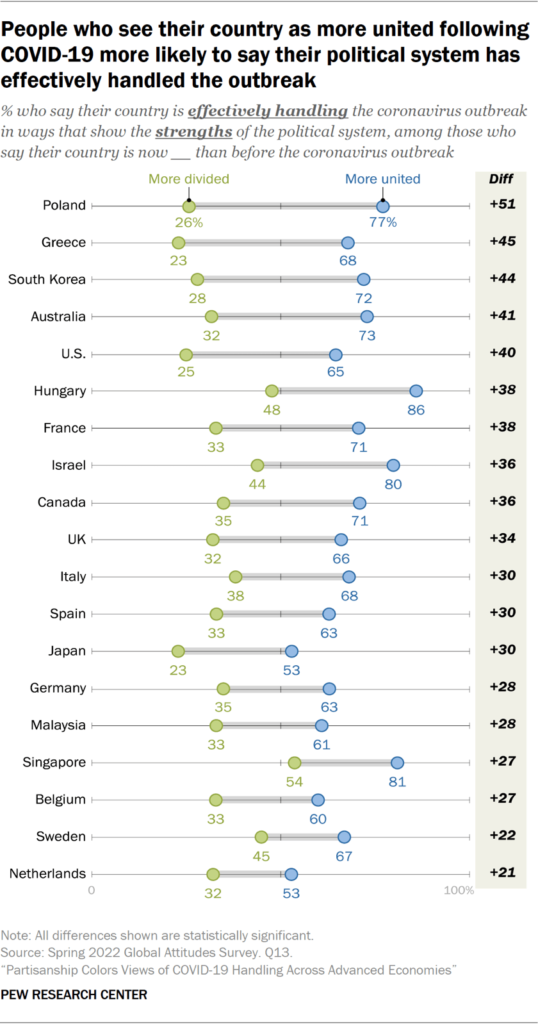
In every country, those who think the country is now more united than it was before are more likely to say Covid-19 highlighted the strengths of their political system than those who think their country is more divided.
Only a third of Malaysian respondents who think their country is now more divided than before the Covid-19 pandemic say they see the strengths in their political system thanks to the pandemic, compared with 61 per cent of those who think Malaysia is now more united.
Most countries look favourably on their country’s Covid-19 response, with a median of 68 per cent across 19 nations who say their country has done a good job dealing with the coronavirus outbreak.
Such positive feelings are most common in Singapore, with 88 per cent approving of their country’s Covid-19 response, followed by Sweden (82 per cent) and Malaysia (77 per cent).
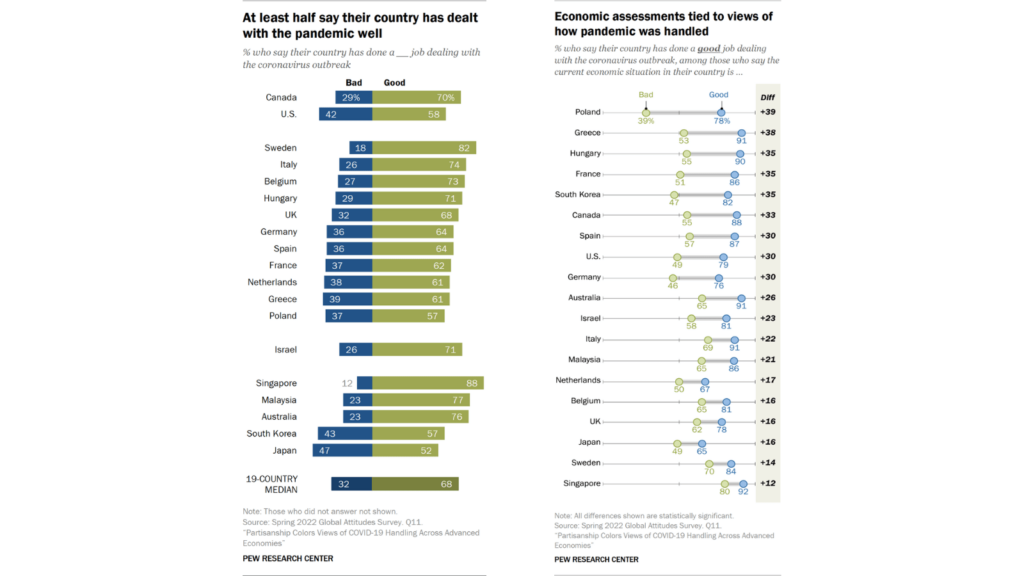
Pew Research Center noted that views of a country’s handling of the pandemic in 2022 were largely unrelated to the number of deaths in the country, the number of cases, or vaccination rates, unlike last year when positive assessments of a government’s Covid-19 response were strongly linked to the number of Covid-related deaths in the country.
This year, views of Covid-19 responses were closely tied to assessments of the current economic situation. In every country surveyed, those who have positive views of the current economic situation in their country are more likely to think their country’s coronavirus response has been good.
In Malaysia, 65 per cent of respondents who view the current economic situation in their country as bad believe the government has done a good job dealing with the Covid-19 pandemic, 21 points lower than the 86 per cent share among those who think Malaysia’s economy is currently good.
The government dropped all lockdown measures across the country by the start of 2022, before repealing outdoor mask mandates and MySejahtera check-ins from May 1.
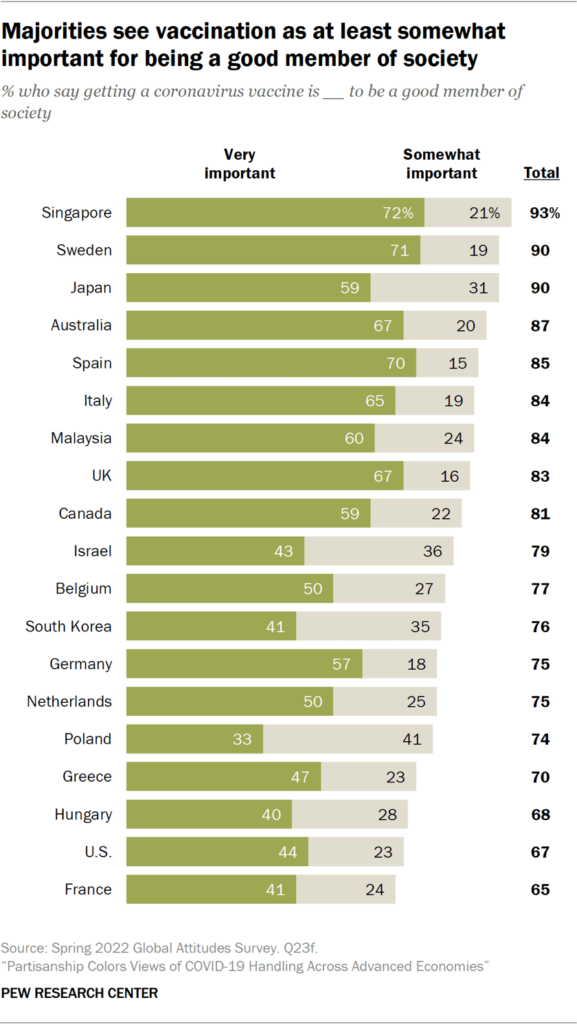
Six in 10 Malaysians say getting a Covid-19 vaccine is “very important” to be a good member of society, lower than Singapore (72 per cent), Sweden (71 per cent), Spain (70 per cent), Australia (67 per cent), the United Kingdom (67 per cent), and Italy (65 per cent).
Across the 19 countries surveyed, vaccination rates reflected public opinion towards vaccines, as the share of the public who think it’s very important to get a vaccine to be a good member of society is linked to the actual population that was fully or partially vaccinated at the time that fieldwork began. Malaysia was listed among a handful of countries that vaccinated 80 per cent or more of its population then.
Political differences played a strong role in whether people think vaccination is crucial to be good members of society. In every nation, supporters of the ruling party were much more likely to say it is very important to be vaccinated than those who do not support their current government.
However, the role of partisanship in opinions about vaccination was the smallest in Malaysia, where 65 per cent of Umno-BN supporters think Covid-19 vaccines are very important, just seven points higher than 58 per cent of those who do not support the ruling coalition.


